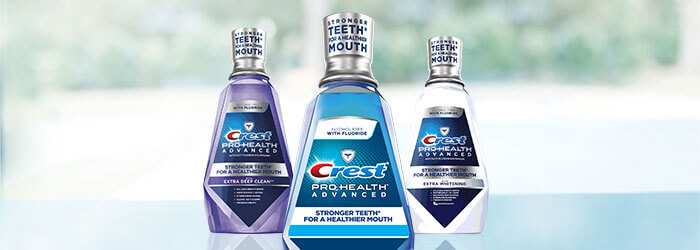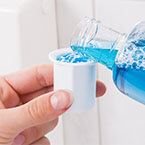Types of Mouthwash: Find the One That Works for You

Table of Contents
One of the key things you'll need to know when considering which type of mouthwash to use for your oral care routine is the differences between them.
Know the Different Types of Mouthwash
A mouthwash freshens your breath, but it doesn't clean your teeth. Mouthwashes are not a replacement for a regular routine of twice-daily tooth brushing and daily flossing, although they can help wash away excess food particles in your mouth. A standard over-the-counter mouthwash contains breath-freshening ingredients such as mint flavoring, but it doesn’t contain fluoride unless the label says so.
Alcohol Mouthwash
Some people consider using a mouthwash as part of their daily oral care routine, but are discouraged by the alcohol content. For some of these people, rinsing for the recommended length of time with an alcohol-containing product (many mouthwashes are about 20 percent alcohol) is uncomfortable. Others are worried about the fact that the 20 percent alcohol content is enough to cause illness in children or teens who experiment by drinking mouthwash. Also, some recovering alcoholics avoid mouthwash because the alcohol content has been shown to trigger a relapse.
Alcohol-Free Mouthwash
But alternatives are available. You can find alcohol-free mouthwash that provides similar oral health benefits to a typical alcohol-containing product. Consider a mouthwash with CPC (cetylpyridinium chloride). This ingredient is found in many health care products. CPC has been shown to be safe and effective. In a mouth rinse, it binds to the surface of germs and causes them to burst, which helps reduce their buildup on the teeth.
Fluoride Rinse
A fluoride mouth rinse doesn't remove plaque, it works by protecting your tooth from acids produced by the bacterial plaque, and it is not a substitute for brushing and flossing. The fluoride in a fluoride rinse incorporates into the enamel coating of your teeth, and it can help protect against cavities in people who are susceptible.
What You Need to Remember
Remember, a mouthwash or a fluoride mouth rinse should be used after you finish your tooth brushing and flossing routine. Also, keep in mind that mouthwashes or mouth rinses are not recommended for children younger than 6 years old, because kids that age may be inclined to swallow the rinses rather than spit them out.
FAQs
-
Which mouthwash is best for gum disease?
-
What mouthwash do dentists recommend for bad breath?
-
Does mouthwash help with tonsil stones?
-
What to avoid in mouthwashes?
Table of Contents
- Know the Different Types of Mouthwash
- Alcohol Mouthwash
- Alcohol-Free Mouthwash
- Fluoride Rinse
- What You Need to Remember
-
- FAQs
- Related Articles

Sign Up
for expert advice and exclusive offers

Sign Up
for expert advice and exclusive offers





